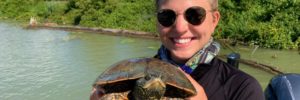Funded By
Research Team
Steven Cooke –Professor, Department of Biology and Institute of Environmental Sciences, Carleton University, Ottawa, Ontario
Colin Rennie – Professor, Department of Civil Engineering, University of Ottawa, Ottawa, ON,
Dany Garant – Professor, Department of Biology, Université de Sherbrooke, Sherbrooke, QC,
Gabriel Blouin-Demers – Professor, Department of Biology, University of Ottawa, Ottawa, ON
Jesse Vermaire – Professor, Department of Geography and Environmental Studies, Carleton University, Ottawa, ON
Joseph Bennett – Professor, Institute of Environmental Science and Department of Biology, Carleton University, Ottawa, Ontario
Nathan Young – Professor, Sociological and Anthropological Studies, University of Ottawa, Ottawa, ON
Chantal Vis– (Science Team Collaborator) Ecosystem Scientist, Parks Canada, Gatineau, ON
Valerie Minelga– (Management Liaison) Environmental Assessment Scientist, Waterways Project Delivery, Parks Canada, Peterborough, ON
Lisa Donaldson – (Project Coordinator) Research Biologist, Department of Biology, Carleton University, Ottawa, Ontario
Research Summary
Parks Canada is the primary steward of the Rideau Canal (completed in 1832, stretching 202 km) and the Trent-Severn Waterway (completed in 1920, stretching 386 km), two national historic waterways that support many recreational, cultural, and economic activities (e.g. boating, fishing, swimming). Protecting the interconnected cultural, natural and social values of these waterways is increasingly difficult for Parks Canada and its partners given the many anthropogenic stressors (e.g. invasive species, shoreline development, urbanization, land-use), as well as broader influences such as climate change. How could lock and dam operations benefit biodiversity? What shoreline erosion management strategies should be adopted? How are over-abundant, aquatic macrophytes best controlled? And how can waterway users contribute to existing and alternative management strategies? These are questions that managers encounter on a daily basis and must address with limited scientific evidence or capacity.
This research is a three-year project being done in collaboration between seven professors and two Parks Canada staff, and will result in the creation of eight new graduate student thesis projects.
The objectives of the research activities are to:
(1) Determine the influence of dam and lock station presence and operations on abiotic (i.e. water, sediment, nutrients) and biotic (i.e., recreational fish, at risk fish and turtles, invasive species) connectivity at a system and at a reach scale
(2) Identify the effects of shoreline habitat and aquatic macrophyte management strategies on ecosystem structure
(3) Investigate the perspectives of key stakeholders related to waterway management scenarios and communication strategies.
These projects will be supported locally by conservation organizations, including the Rideau Valley Conservation Authority and the Big Rideau Lake Association. The research will help safeguard the social, cultural, and ecological values of these nationally significant waterways by providing Parks Canada with the environmental and social science evidence needed for effective management and policies.
Please see the Opportunities section of this website for further details related to
graduate student recruitment for these projects.




